
Understanding the Guardianship Framework and Support Options
The process of establishing legal guardianship for adults with disabilities is complex but essential for ensuring proper care and support for incapacitated individuals. This article provides a comprehensive overview of how to access guardianship, the responsibilities involved, legal requirements, and alternatives to guardianship that protect personal autonomy and rights.
Initiating the Guardianship Process for Adults with Disabilities
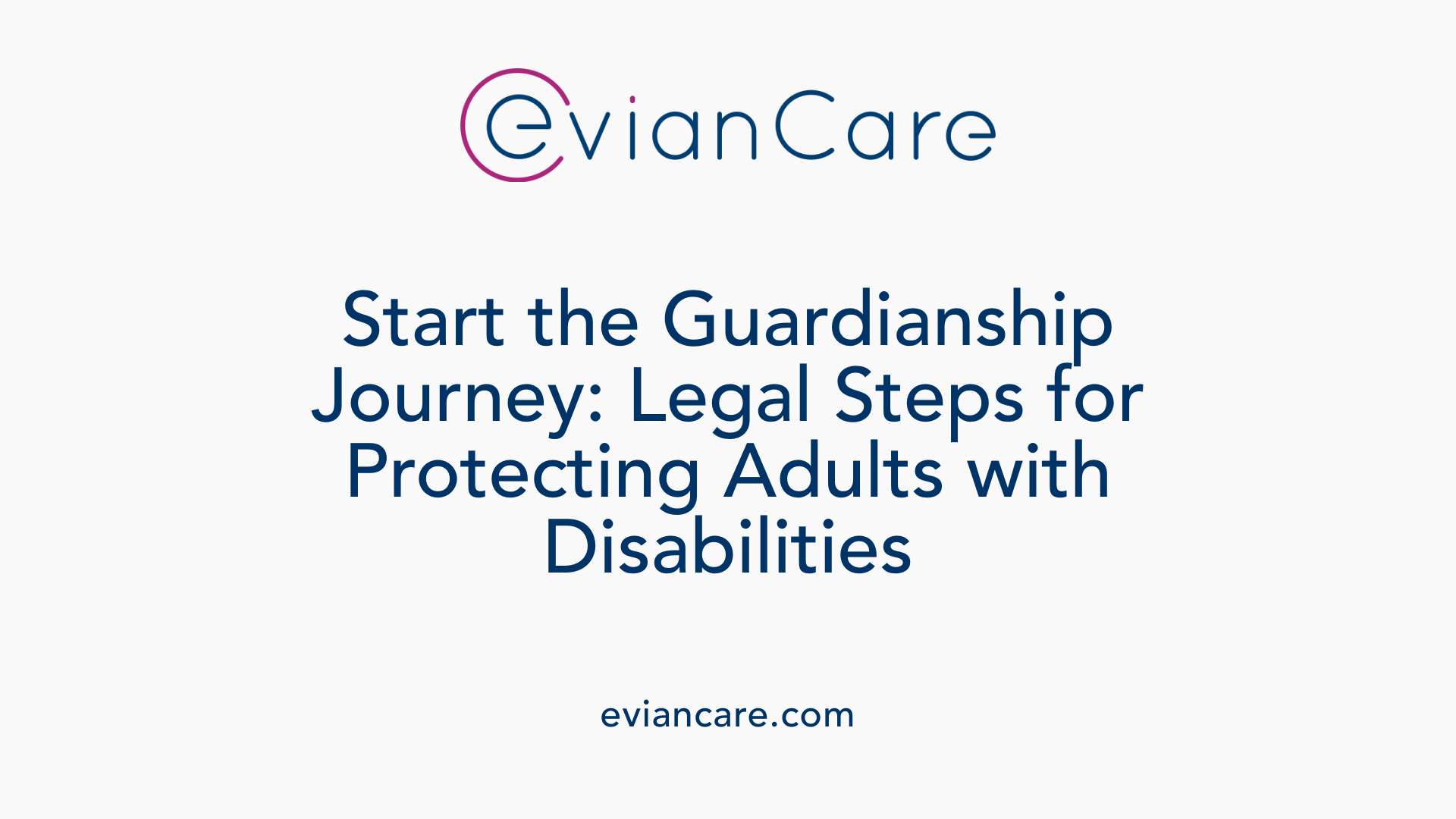
How do you initiate legal guardianship for an adult with disabilities?
To begin guardianship proceedings, the first step is to demonstrate that the adult is incapacitated and unable to manage their own affairs. This involves filing a petition in the appropriate court, often the jurisdiction where the adult resides.
Once the petition is filed, the court typically appoints an attorney to represent the interests of the individual suspected of being incapacitated. This ensures the adult’s rights are protected throughout the process.
Steps to file a guardianship petition
Filing a guardianship petition involves several detailed steps:
- Completing specific court forms available online or through the local court.
- Submitting an affidavit from a qualified medical professional, such as a doctor or psychologist, stating that the individual cannot care for themselves.
- Serving legal notices or summons to the proposed ward, family members, or interested parties.
- Providing objective evidence, including medical records and assessments, to support the claim of incapacity.
The court will review all submitted documents and hold a hearing where evidence and testimonies are considered.
Legal prerequisites for guardianship
Legal standards require clear, convincing evidence that the adult cannot reasonably care for themselves due to mental illness, developmental disabilities, physical illness, or injuries.
The adult must be at least 18 years old, and the process involves establishing that no less restrictive alternative (like powers of attorney or supported decision-making) can adequately support the individual.
Role of legal counsel in guardianship proceedings
Securing legal guidance is highly recommended. An attorney experienced in guardianship law can help prepare and submit the necessary paperwork, represent the petitioner during court hearings, and ensure all legal procedures are properly followed.
Legal counsel also advocates for the adult’s best interests and assists in exploring alternative options if appropriate.
Continuously, legal professionals can help navigate the complex legal standards and procedures, safeguarding the rights of the incapacitated adult.
For more information, a simple search for "guardianship initiation process for adults with disabilities" provides detailed localized procedures and resources.
Duties and Responsibilities of a Guardianship
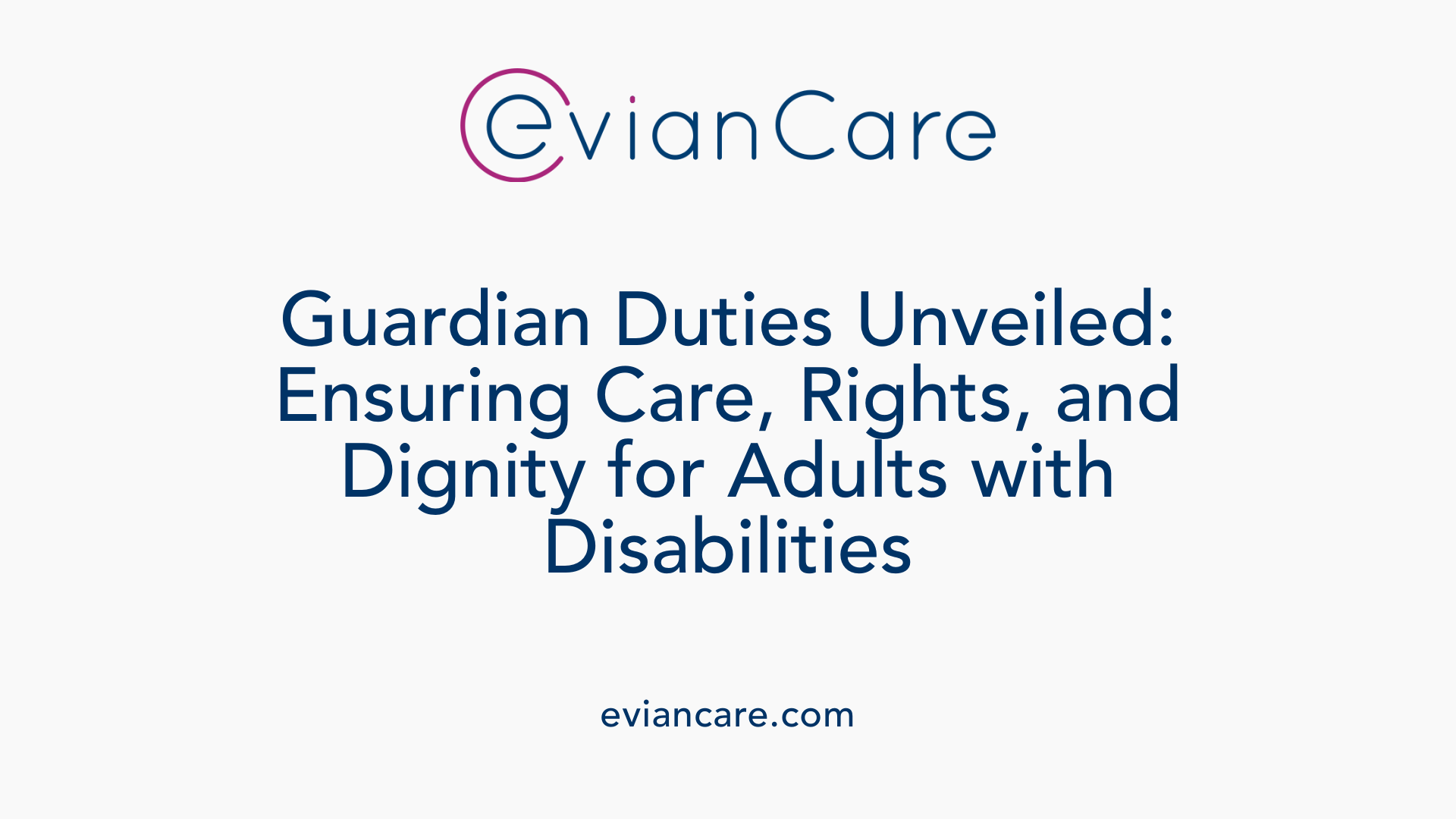
What are the responsibilities and duties of a legal guardian for an adult?
A legal guardian for an adult is appointed by a court to make important decisions on behalf of an incapacitated individual, often called the protected person or ward. The guardian's main role is to provide proper care and ensure the well-being of the adult.
Guardians are responsible for managing daily needs such as food, clothing, shelter, and access to health care services. They may also make decisions about the adult’s medical treatment, including consent for procedures or medications, often under court guidelines. In cases where the guardian has authority over financial matters, they manage estate assets, oversee bank accounts, pay bills, and handle property transactions.
Their obligation is to act in the best interests of the individual, prioritizing safety, health, and rights. Guardians must respect the adult’s preferences and wishes whenever possible, especially if the court has limited their decision-making power. The scope of their authority can be broad or limited, depending on the court’s judgment and the adult’s needs.
Guardianship continues until the adult recovers sufficient capacity or passes away. Throughout the process, guardians are expected to keep the court informed with regular reports and must act responsibly, ethically, and within the boundaries of their legal duties, always striving to support the best interests and dignity of the person they serve.
For more detailed information on guardian duties, searching “guardian duties and responsibilities for adults with disabilities” can provide additional insights into the scope and expectations of guardianship roles.
Legal Forms and Procedures for Guardianship
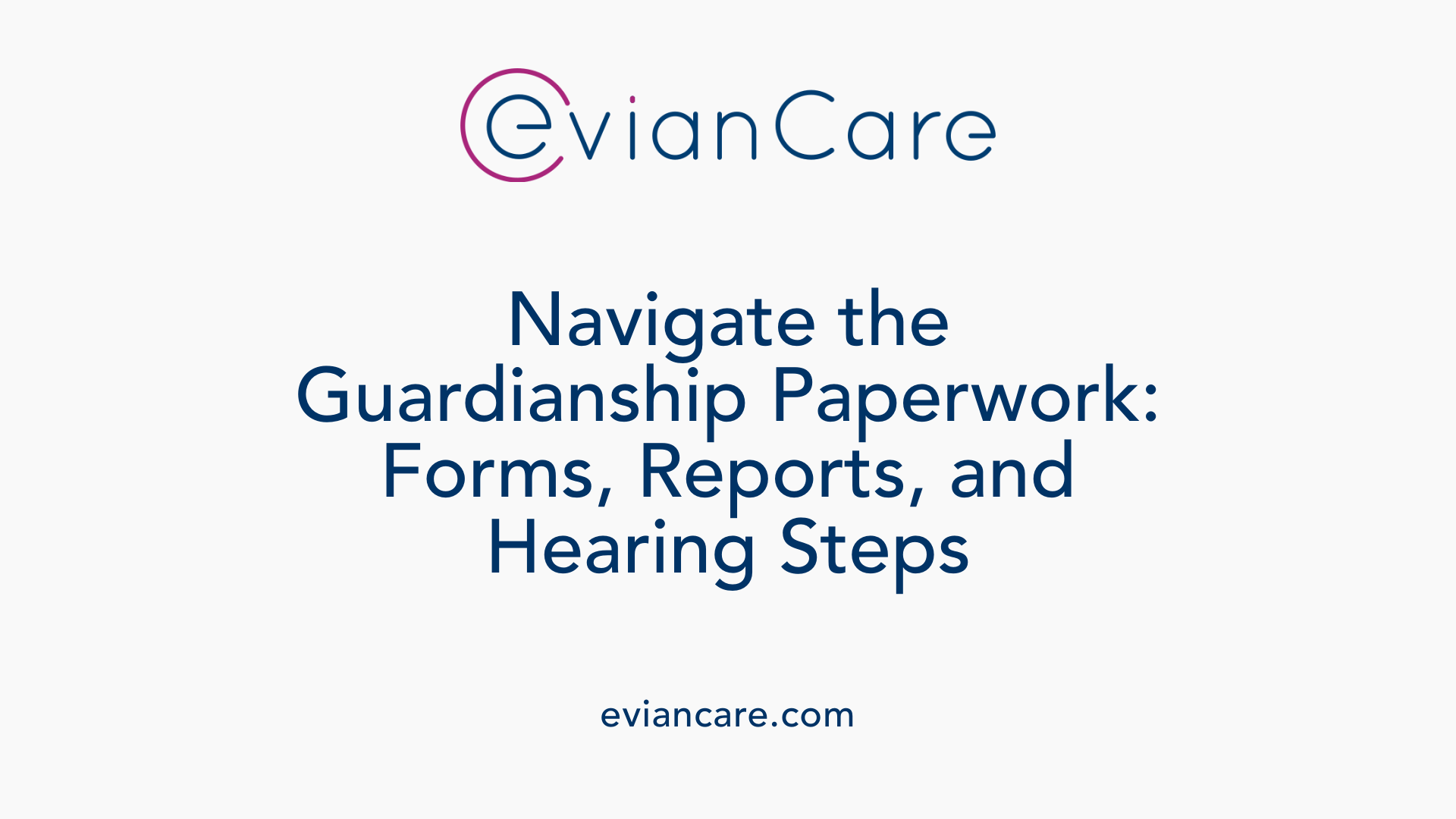
What legal forms are needed to establish guardianship for an adult with disabilities?
To initiate the guardianship process for an adult with disabilities, specific legal forms are required. The process typically begins with filing a formal petition in the appropriate court—often the probate or surrogate court in your jurisdiction. This petition outlines the reasons why guardianship is necessary and provides details about the proposed ward.
In addition to the petition, supporting documentation such as medical or psychological assessments must be submitted. These reports confirm the person's incapacity and justify the need for a guardian. A physician or qualified health professional usually needs to provide an affidavit or report attesting to the individual's inability to manage personal and financial affairs.
A court-appointed attorney ad litem may be involved to investigate the case and prepare a report on whether guardianship is appropriate, exploring less restrictive alternatives first. All forms and reports are submitted together as part of the legal package to the court.
Once the paperwork is prepared, a court hearing is scheduled where evidence is reviewed, and the guardian is appointed if the court finds the evidence persuasive. Periodic updates and reports are then required to ensure the guardian’s continued appropriateness and to protect the individual's rights.
Necessity of medical and legal documentation
Medical documentation is crucial to establish the incapacity. This includes detailed assessments from licensed medical professionals who evaluate the individual's cognitive and physical abilities. The evidence must demonstrate that the person cannot care for themselves or manage their affairs.
Legal documentation complements medical reports by formally requesting guardianship and outlining the scope of authority the guardian should have. These forms must be complete and accurate, as errors can delay or jeopardize the process.
Court hearings and appointment process
The court hearing serves as a pivotal step. During this proceeding, the judge reviews all submitted documents, hears testimony from medical professionals, and considers the proposed guardian’s qualifications. The court may also evaluate the preferences of the incapacitated adult, if expressible.
If the judge determines that guardianship is appropriate, they issue an order appointing the guardian. The order specifies whether the guardian has full or limited authority and outlines any restrictions. The process emphasizes protection of the individual’s rights and ensures that guardianship is only granted when truly necessary.
In summary, establishing guardianship involves preparing specific legal forms, supporting medical evidence, and participating in a court hearing—each step designed to safeguard the rights and well-being of adults with disabilities.
| Step | Required Documentation | Purpose | Additional Notes |
|---|---|---|---|
| Filing Petition | Guardianship petition form | Initiates the legal process | Must include details about the proposed ward |
| Medical Evidence | Medical or psychological assessments | Prove incapacity | Must be from licensed professionals |
| Court Hearing | Testimony, evidence, and reports | Decide on guardianship appointment | Court reviews all submitted info |
| Post-Appointment | Periodic status reports | Ensure continued suitability | Reports submitted annually or as ordered |
For more details, searching for "guardianship legal documentation and procedure" can provide extensive resources and guides.
Types of Guardianship and Legal Standards
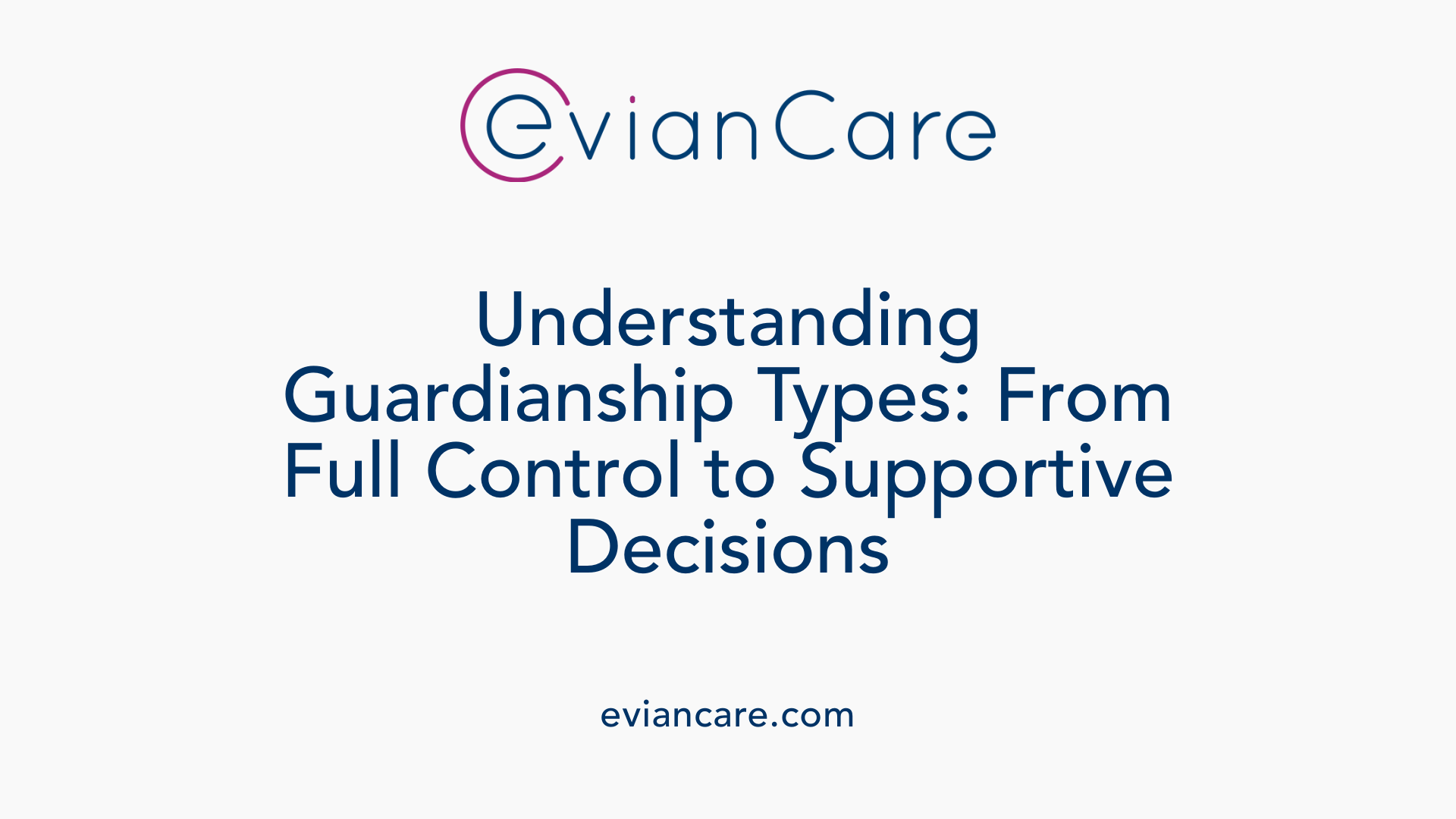
What types of guardianship exist for adults with disabilities?
There are several types of guardianship for adults with disabilities. Full guardianship, also known as plenary guardianship, grants the guardian complete authority over the individual’s personal and financial decisions. This type is usually reserved for individuals who are unable to make any decisions for themselves.
Limited guardianship restricts the guardian’s powers to specific areas, such as medical decisions or financial management, allowing the individual to retain rights in other aspects of their life. The court typically emphasizes less restrictive options whenever possible.
Temporary guardianship is enacted to address urgent situations for a limited period, often not exceeding a year. It enables swift intervention in emergency circumstances but requires court approval and oversight.
Beyond guardianship, many jurisdictions recognize alternatives that support autonomy. Supported decision-making agreements, powers of attorney, and advanced directives are examples of tools that enable adults to actively participate in decisions, with assistance from trusted individuals.
Guardians of the person handle daily life choices, including healthcare, housing, and personal well-being. Meanwhile, guardians of the estate manage financial matters, such as bank accounts, property, and investments.
Before establishing guardianship, courts scrutinize the individual’s capacity and prioritize the least restrictive means to protect their rights. This approach aims to balance safety with independence, promoting dignity and self-determination whenever feasible.
Legal Standards and Oversight in Guardianship Cases
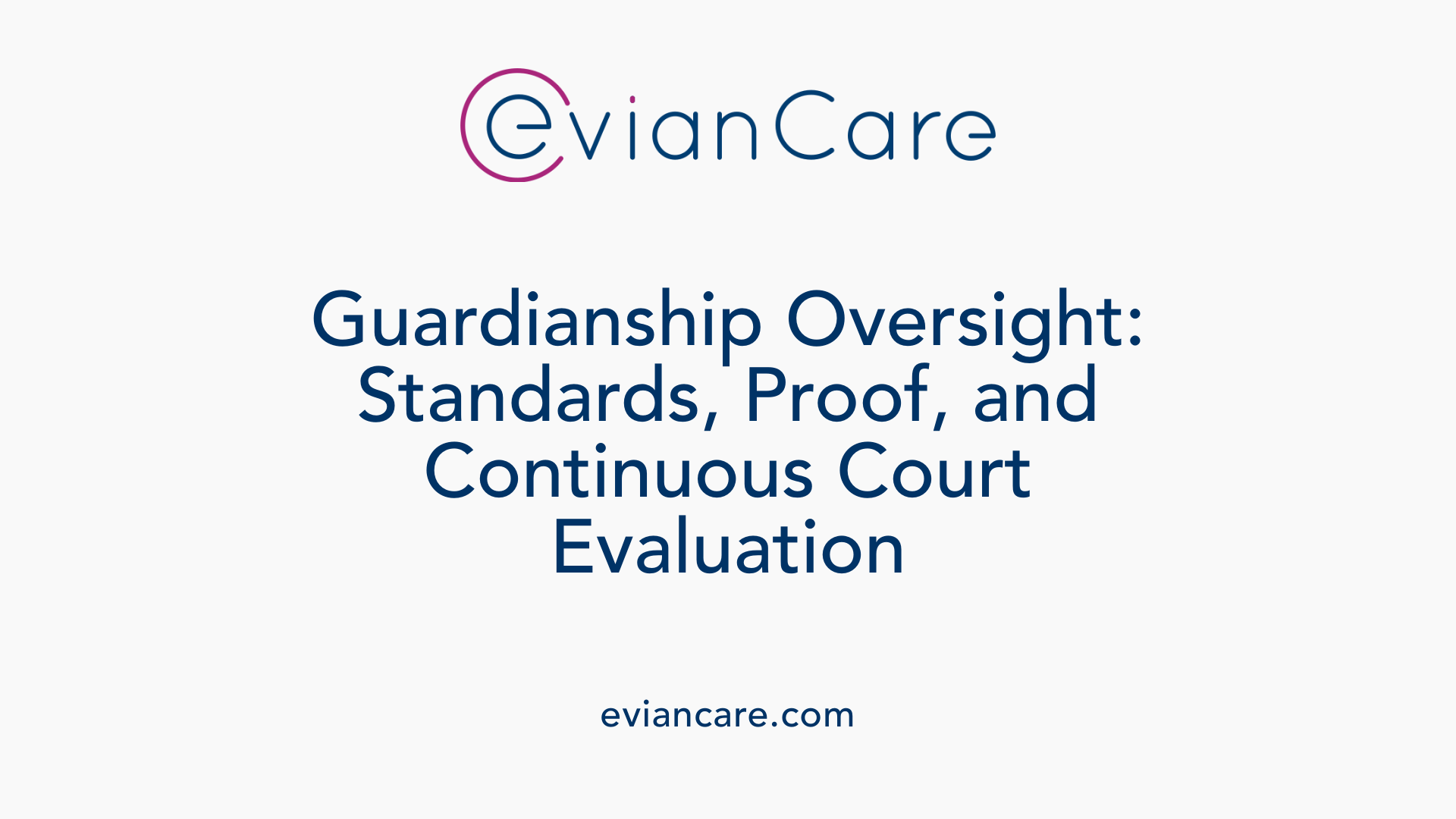
What is the standard of proof required to establish incapacity for guardianship?
In guardianship proceedings, courts require a high level of evidence to determine that an individual is incapacitated and needs a guardian. The accepted standard is generally termed as clear and convincing evidence. This means the court must be significantly persuaded that the person cannot make or communicate essential decisions due to mental, physical, or cognitive impairments.
To meet this standard, courts often rely on detailed medical reports, psychological assessments, and testimony from healthcare professionals. These expert evaluations provide objective proof of the individual’s inability to handle personal or financial matters safely and effectively.
The process involves a formal hearing where evidence is scrutinized, and the individual’s capacity is carefully assessed. The court looks at whether the person can understand, communicate, and make decisions about important issues. In some cases, existing legal directives or prior nominations are considered, but medical evidence remains crucial.
This rigorous process helps protect individuals’ rights while allowing for guardianship when truly necessary. The standard’s purpose is to prevent unwarranted restrictions on autonomy and ensure guardianship is only imposed when the evidence clearly demonstrates incapacity.
Court evaluations and assessments
Before appointing a guardian, courts conduct comprehensive evaluations.
These assessments often include:
- Medical examinations by licensed physicians
- Psychological and psychiatric evaluations
- Review of medical records and reports
- Evidence of the individual’s ability to manage basic needs
The evaluations serve to determine the level of incapacity and whether a limited or full guardianship is appropriate. The court may also appoint a guardian ad litem—a lawyer or advocate—to investigate and present findings on what arrangement best serves the individual’s interests.
Ongoing court oversight and reports
Guardianship is not a one-time decision. Courts maintain oversight by requiring regular reports from guardians. These reports, filed typically every one to three years, update the court on the ward’s well-being, financial management, and healthcare.
The court reviews these reports to confirm that the guardian is fulfilling their duties appropriately and that the individual’s condition has not significantly changed.
If the person’s capacity improves, the court may consider modifying or terminating the guardianship. Conversely, if neglect or misconduct is reported, the court can take corrective actions, including removing the guardian.
This ongoing supervision ensures guardianship remains appropriate over time and aligns with the best interests of the incapacitated individual.
| Standard of Proof | Evaluation Methods | Court Oversight Frequency |
|---|---|---|
| Clear and convincing evidence | Medical and psychological assessments | Every 1-3 years |
| Must demonstrate incapacity to manage decisions | Testimony from healthcare professionals | Court reviews reports and can modify guardianship |
| Ensures due process and protection of rights | Review of medical records | Court can revoke or adjust guardianship if necessary |
Consulting legal counsel and expert evaluations help ensure that guardianship proceedings are conducted properly, and the rights of the individual are protected throughout the process.
Ensuring Rights and Exploring Alternatives
While guardianship provides critical protections and support for adults with disabilities unable to care for themselves, it is essential to consider less restrictive options that respect individual autonomy. Legal guardianship involves significant responsibilities, legal formalities, and ongoing oversight. Individuals and families should seek professional legal guidance throughout the process. Alternatives such as supported decision-making, powers of attorney, and healthcare directives can often provide meaningful support while preserving independence, aligning with evolving policies prioritizing personal rights and dignity.
References
- Guardianship of Incapacitated or Disabled Persons
- Legal Guardianship of an Adult: Becoming a Guardian
- Disabled Connecticut Adult Guardianships | Hartford Lawyers
- Understanding Legal Guardianship for Adults
- Guardianship of a Developmentally Disabled Person | NY ...
- Alternatives to Guardianship
- Guardianship for Adults with Developmental Disabilities in ...
- Guardianship and Protecting Your Loved One with an ...












